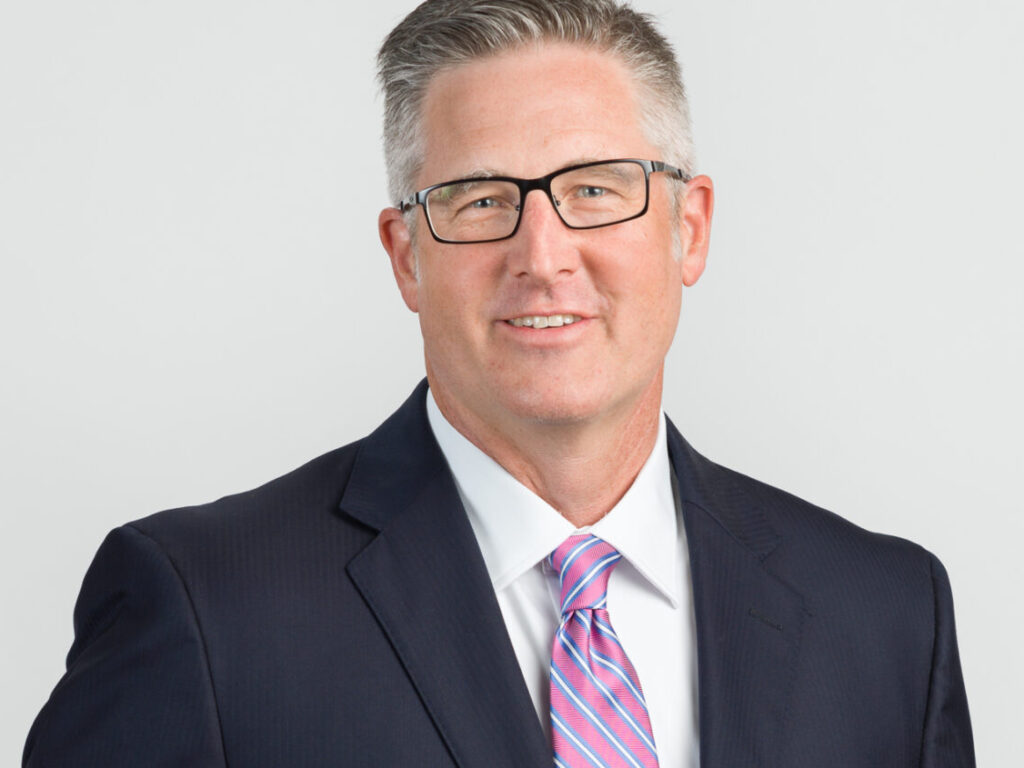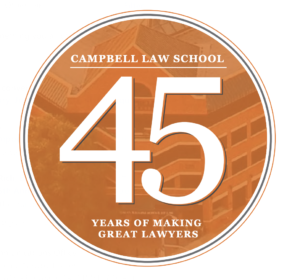Campbell Law 45th Alumni Anniversary Spotlight: Tony Biller ’97

Nominee: Anthony “Tony” Biller, Class of 1997
Anthony “Tony” Biller is a 1997 magna cum laude graduate from Campbell Law School. He is a partner at Envisage Law in Raleigh, North Carolina, where he practices business, intellectual property, real estate and tax law, and assists clients in wealth and estate planning.
Biller served four years as an officer in the United States Army and earned his undergraduate degree from Purdue University where he was a Distinguished Military Graduate. During his time at Campbell Law, he served as the managing editor for the Campbell Law Review and since graduating, has taught Intellectual Property Rights in the past as an adjunct professor at the law school. Biller also served as a United States District Court judicial clerk to the late Honorable William L. Osteen Sr. in the Middle District of North Carolina.
Biller is admitted to the practice of law in the State Courts of North Carolina, the United States District Courts for the Eastern, Middle and Western Districts of North Carolina, the United States Court of Claims, the Federal Courts of Appeal for the Federal, Fourth, Sixth and Eleventh Circuits and the United States Supreme Court.
Nominator: Leonard Brown III, Class of 1998
Judge Leonard Brown III earned his Bachelor’s of Science degree in economics from the United States Military Academy at West Point in 1991. After graduating, he attended Campbell Law from 1995 to 1998 where he was a member of the Trial Team and Law Review. Judge Brown served as a Lieutenant Colonel in the U.S. Army Reserves from 2008 to 2013. He was elected in 2011 to serve as a judge on the Lancaster County Court of Common Pleas in Pennsylvania and also teaches international human rights and humanitarian law at Franklin & Marshall College.
Q: Tell us about your extensive experience in private practice and your favorite thing about your practice area(s).
A: I have been in private practice since finishing my judicial clerkship for Judge William Osteen, Sr. in the Middle District of North Carolina in 1998. For the next two decades thereafter, I focused on intellectual property litigation and IP management. In the past five years, my practice has broadened significantly as clients have increasingly brought me their non-IP cases and their non-litigation legal needs. Like many attorneys, I have been blessed to grow my practice with the needs of my clients. In the past few years, I have done much more contract negotiations, licensing and non-IP litigation. In 2020, I started doing more constitutional litigation and really enjoy this area of the law. I’ve been able to defend the constitutional rights of protestors, police officers, churches, gyms and bowling alleys, while at the same time working on more conventional IP and commercial issues. Changing areas of my practice are one of my favorite things about the practice of law – the ability to continually learn new things. Cases often bring new clients, new industries, technologies, legal issues and quite often issues you never anticipated. In some cases, particularly in areas of evolving technology, you learn about things you never knew existed! The practice of law provides windows into so many different areas and aspects of life that you might otherwise never experience. You also get to meet and work with interesting people.
Q: How did Campbell Law School prepare you for your career?
A: Foremost, Campbell made me work hard and made me know the law. Getting a bad grade in a class you’re paying for is one thing, but having Professor Lord stand you up and make you look and feel like a Bozo because you did not carefully read the assigned cases was something we all wanted to avoid – quite the motivation to stay diligent in our studies! They really pounded us on learning the foundations of law. To this day, I regularly think back to what I learned at Campbell when helping clients with their legal needs or am evaluating the legal arguments of an opposing attorney. The faculty at Campbell also really challenged me in my faith and challenged me to think as a Christian lawyer. That was my first exposure to Christian professors and they taught me how to view my practice and legal reasoning in the context of my faith and in the context of the Bible. When I talk to other lawyers about their legal training, this aspect of what I experienced in Campbell seems special.
Q: Prior to practicing law, you served four years as an officer in the United States Army where, as a Jumpmaster and Ranger, you led soldiers in the 82nd Airborne Division. You also served as a United States District Court judicial clerk to the late Honorable William L. Osteen, Sr. in the Middle District of North Carolina. Do you have certain skills that you have utilized throughout all your positions?
A: Both were very valuable to becoming the type of lawyer I am today and both were entirely dissimilar experiences. Being an Army Ranger (or Force Recon Marine, SF, Seal, etc.) requires endurance, or grit. It requires hard work and sheer determination. That’s a quality that serves well in any profession, but particularly in the practice of law where much of the challenges of our profession require work and perseverance to get our clients through. The Army is also really good at teaching leadership and teamwork. Clerking for Judge Osteen has been one of the highlights of my legal career. He was an outstanding gentleman and attorney. The time spent working for the Judge and being mentored by him and his grammatically perfect assistant/editor Anne Vaughn was invaluable. Not only are you mentored by a sage jurist, but you also get to see the wide range of representation styles and aptitudes in the federal civil and criminal bars, and understand how the court responds, while working on really interesting cases (without having to bill time!). I strongly encourage graduating law students and young attorneys to pursue federal district court clerkships.
Q: Share a memory or experience that has had a lasting impact on your career.
A: There are so many positive memories that this is the most difficult question for me to answer. Literally, the most lasting impact experience occurred within the first five years of practicing law. I became a Christian very late in law school. When I graduated, I had my clerkship and law firm job thereafter lined up, but I thought I was supposed to go to seminary now that I was a Christian. However, God had different plans and kept closing doors. Finally, out of frustration, I got down on my knees, in my closet, and told God that I thought I was supposed to be a pastor, not a lawyer, but if that was not his plan, to please let me know so I could stop struggling. No exaggeration, but in the next few weeks, two of my favorite ministries called me for the first time and requested legal help. One of them turned into a massive, multi-year legal problem that spanned several continents and brought my IP litigation experiences to bear. The answer to me was clear that God had put me where He wanted me. I did not look back and have since been blessed with representing several fantastic ministries in addition to my commercial clients.
Q: What does Campbell University’s motto “leading with purpose” mean to you?
A: It means being true to your convictions and being willing to make a stand, even when – especially when – it’s hard. Being willing to stand, in my experience, requires first my willingness to get on my knees and surrender my will to Jesus Christ. That was something my Campbell Law professors wisely shared with us so many years ago. And that remains my daily challenge.
Want to nominate a Campbell Law Alumna/Alumnus to be featured in a 45th anniversary spotlight?
If you would like to nominate a fellow alumnus/na who is living the university’s motto “leading with purpose,” please contact Lisa Snedeker at lsnedeker@campbell.edu for more information.

